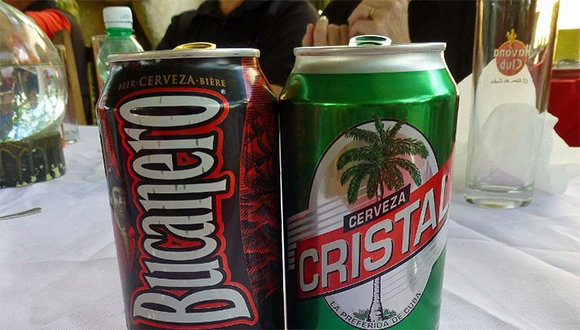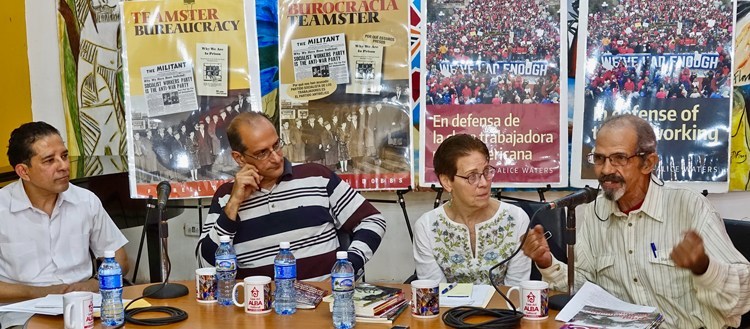Translations 677
Peruvian women demand end to femicide

Peruvian women demand an end to gender-based violence
We have to promote a culture free of machismo, said Peruvian Minister of Women and Vulnerable Populations Gloria Montenegro, who was present at the popular demonstration organized by the collective Ni Una Menos.
By Juventud Rebelde
digital@juventudrebelde.cu
Sunday 18 August 2019 | 09:42:37 am.
A CubaNews translation.
Edited by Walter Lippmann.
 LIMA, August 18.- This Saturday thousands of people held a demonstration in the Peruvian capital called Ni una menos. Women’s organizations demanded protection in the face of the growing number of cases of femicide in the South American country.
LIMA, August 18.- This Saturday thousands of people held a demonstration in the Peruvian capital called Ni una menos. Women’s organizations demanded protection in the face of the growing number of cases of femicide in the South American country.
It was the fourth edition of the annual march to demand an end to femicide, which this year stands at 105, while cases of attempted femicide total about 150 more so far in 2019.
We have to promote a culture free of machismo, said Peruvian Minister of Women and Vulnerable Populations Gloria Montenegro, who was present at the demonstration organized by the collective Ni Una Menos, reports Telesur.
Alejandra Ballón, a spokeswoman for the group, said she was dismayed by the figure of 105 femicides, which means that in Peru a woman is murdered every day.
But there are about 250 femicide attempts and it must be said that for each attempt of femicide there are children, parents, grandparents, a whole family that is dismayed because it has a direct relative who is a victim, Barrón added.
She mentioned that in 2018 there were more than 12,000 cases of rape and that, of those cases, 60 percent of the aggressors are family members and of the adolescents who become pregnant, 90 percent are incest, she said.
Another participant in the demonstration, which toured the streets of downtown Lima, was attorney Arlette Contreras, who denounced the fact that women are also victims of the state through its operators who deny access to justice.
We are in the streets again to denounce gender violence by the aggressors, as well as to denounce the gender violence of the Peruvian State that affects, harms and hurts women victims and survivors, said the jurist.
Facebook and the Surveillance of its Users

Facebook and the Surveillance of its Users
The social network admits to having paid external contractors to listen to and transcribe conversations.
By Juventud Rebelde
Wednesday 14 August 2019 | 09:51:48 pm.
A CubaNews translation. Edited by Walter Lippmann.

Facebook Author: Juventud Rebelde Posted: 08/14/2019 | 09:11 pm
Facebook, the company founded by Mark Zuckerberg, explains that the purpose of the practice of listening to and transcribing conversations from its users was to test the functioning of its artificial intelligence system.
“Hundreds” of external Facebook contractors have listened to and decrypted voice messages that users of the technology giant send in their chats on Facebook Messenger, Bloomberg revealed on Tuesday, quoting sources familiar with the project.
According to its statements, the company paid them to transcribe audio conversations, but did not explain where the recordings were from – several of them with vulgar content – were obtained and why they had to be deciphered.
Facebook has confirmed the information in this regard, specifying that the project ended only a few days ago. “Like Apple and Google, we stopped the human review of audios more than a week ago,” said the company. They also noted that affected users gave their consent to the practice by checking the option of transcription of their recordings in the “Settings” of Facebook Messenger.
Facebook clarified that the aim of the project was to test the functioning of its artificial intelligence system, said RT, which describes it as “a new scandal.”
This is not the first report on the violation of the privacy of users of technological giants. In early August, the corporations Google, Apple and Amazon modified their privacy policies, responding to a wave of criticism caused by reports that they listen to and transcribe audio recordings recorded by their virtual assistants – Google Assistant, Siri and Alexa, respectively – without the consent of the users.
Thus, on August 1, German regulators announced that Google had informed them that it had suspended the transcription of conversations for at least three months. In turn, Amazon allowed Alexa users to delete voice recordings from a database accessible to company employees and contractors on Aug. 2.
Wow, I’m On The Blacklist…!

Wow, I’m On The Blacklist…!
That optimism was not clouded when, also on the morning of the 26th, I knew that a part of me – the writer – had entered the blacklist with which the President of the United States intends to drown us and force us to be a neo-colony – or perhaps one more star of the flag – of his country.
by Pedro de la Hoz | pedro@granma.cu
July 27, 2019 01:07:40
A CubaNews translation.
Edited by Walter Lippmann.
The morning of July 26th confirmed my optimism. To see and feel the people from Granma province [granmenses], in the name of many and in my name, honoring the legacy of the heroes of the Moncada; I could feel, in plain sight and with the heart ahead, the line of continuity between the revolutionary historical generation and the current one; knowing that poetry goes beyond words to settle in the most endearing place of collective memory. This happened when our President referred to the words of Miguel Barnet and Roberto Fernández Retamar, made me think about how much I can, can, deliver to be really better.
That optimism was not clouded when, also on the morning of the 26th, I knew that a part of me – the writer – had entered the blacklist with which the President of the United States intends to drown us and force us to be a neo-colony – or perhaps one more star on the flag – of his country.
As an author, I have signed contracts and published with the Captain San Luis publishing house. Now it turns out that this publisher, together with Verde Olivo [Olive Green, the magazine of Cuba’s Revolutionary Armed Forces] and two more hotels, were added to the list of Cuban entities with which US citizens are prohibited from having financial transactions.
In the case of n publisher, the ban indicates that there is no possibility that a similar American institution negotiates with it the publication of any work in its catalog, nor that a distributor or bookstore in that territory acquires or markets books published in Cuba from the houses mentioned, nor that a US citizen – not the very few who come to the Island in the midst of so many delusional restrictions, but those who visit the book fairs in the world and come up with them at a Cuban kiosk or another country to buy a volume from Captain San Luis and Verde Olivo – is suspected of having acquired publications from entities newly included i\on the Index.
I use this last term because it is obvious the kinship of the measure with the Index Librorum Prohibitorum et Derogatorum (commonly named by the first word) of the Holy Inquisition, in force from 1612 to 1819.
My editor, Julio Cubría, described the situation quite clearly: «The government of President Donald Trump has just included the publishing houses Captain San Luis and Verde Olivo in the list of entities restricted to the people of the United States. By simple presidential decree, the children of that country will not be able to read The Black Doll, by José Martí; nor discover The Night of the Rainbows, with Olga Marta Pérez, nor rescue with Enrique Pérez Díaz to Agatha in Danger. Their adults may not reveal the legend of the National Hotel of Cuba, written by Pedro de la Hoz and Luis Báez; nor to know the stories of the Capitolio, narrated by Ciro Bianchi and, of course, they will not be allowed in any way to know the true history of the dictatorship of Fulgencio Batista in Why the Cuban Revolution?, let alone the monstrosity of the biological war against Cuba, nor what did Fidel find to the triumph of the Revolution? What a great fear of Cuban culture. In spite of laws and blockades, our publishing house will continue as up to now exalt the truth ».
Behind the fight against Captain San Luis and Verde Olivo, the White House uses a pretext: both editorials are attached, respectively, to the Ministries of the Interior and the Revolutionary Armed Forces. Witch hunters don’t give a damn if published books deal with history, be they fiction, or testimonial accounts of general interest.
Looking at things well, however, it occurs to me that such a ban is associated with the cultural needs of the current occupant of the Oval Office. His response to the journalist Megyn Kelly was public and notorious when inquiring about his literary tastes: “I read passages, summaries, chapters, but I don’t have time to read.”
The last straw is that they are given by the author. His titles? How to get rich and think like a multi-illionaire. It would be enough to compare themes and contents with the books of the publishers Capitán San Luis and Verde Olivo, to coincide with what a writer expressed in the Mexican magazine Letras Libres – nothing to see or by any means with a thought close to the left – about the character : “Trump’s lack of culture will go down in the history of the country as a loss”.
Transfermóvil Offers New Services

Transfermóvil offers new services
As of this Wednesday, an updated version of Transfermóvil is available, the application that allows you to manage several public services through online payment.
Thursday 08 August 2019 | 12:06:11 am
A CubaNews translation.
Edited by Walter Lippmann.
 As of this Wednesday, an updated version of Transfermóvil is available, the application that allows managing various public services through online payment, developed jointly with Etecsa, Banco Popular de Ahorro, Banco de Crédito y Comercio and Banco Metropolitano.
As of this Wednesday, an updated version of Transfermóvil is available, the application that allows managing various public services through online payment, developed jointly with Etecsa, Banco Popular de Ahorro, Banco de Crédito y Comercio and Banco Metropolitano.
On this occasion, the Nauta Top-Up and Mobile Micro Top-Up services are added, features that are free of charge and do not consume mobile data, according to Etecsa’s Facebook page.
Among the services offered are banking, public and communications. You can download the APK from Etecsa’s websites (www.etecsa.cu); Apklis (www.apklis.cu), through the Central Bank’s websites and through Cubacel’s Facebook page.
Mayra Arevich, executive president of Etecsa, in her Twitter account commented: “Today we are launching a new version of Transfermóvil, a Cuban application that facilitates payment management for its clients. We will continue this August adding new services”.
Transfermóvil is a computer platform for cellular network subscribers. It allows them to make online payments for public services and to manage telecommunications services from any mobile terminal, using their Telebanca card associated with one of their bank cards, according to the bank to which they belong.
Roger Calero: Immigrant, Radical and Worker
 Roger Calero: Immigrant, Radical and Worker
Roger Calero: Immigrant, Radical and Worker
From the perspective of a worker living in the United States, I learned to admire the Cuban cause much more…
By DUNIA TORRES GONZÁLEZ
August 8, 2019
Translated and edited by Walter Lippmann for CubaNews

From the left: Róger Calero was recently in Havana, this time on behalf of Editorial Pathfinder, to present Farrell Dobbs’ Burocracia Teamster. (Photo: Jonathan Silberman/Militante).
Roger Calero was recently in Havana, in March 2019, at the Museo de los Trabajadores Palacio de los Torcedores, this time on behalf of Pathfinder Publishers to present Teamster Bureaucracy, by Farrell Dobbs (Missouri, 1907-California, 1983), and In Defense of the North American Working Class, by Mary-Alice Waters (1942), two publications that write about the labor movement in the United States. Calero is a union activist and correspondent for The Militant newspaper…
I was happy to know much more about his work, which made me admire the Cuban cause with greater fortitude. I remember the first time we met: Roger Calero and his compañeros, came to Santiago de Cuba to find out about the damage caused by Hurricane Sandy. He wanted to help. Later, in a room in San Carlos de la Cabaña, at the 2014 Havana International Book Fair, our first conversation began.
“I’m not that important,” he said, but he agreed to tell me about how he got involved in political activities. His story shows us that other face of the situation of immigrants in the United States, which has nothing to do with the “American dream”. He proudly repeated, “I’ve been a militant for 20 years”.
“Many families risk their children’s lives [trying] to reach ‘the promised land’. For the past 25 years, I have been living in the United States. I witnessed the early years of the Nicaraguan Revolution. I was very impressed. When I moved to the U.S., I learned about the real life of the workers. As a child, you can imagine what the movies convey, what is beautiful, everything in quotation marks… that fetishism of merchandise, that you have to have it, but reality immediately won out. When I started school I realized what the place of each social class was,” he said on that occasion.
From 1990 to 1991, the world witnessed a sad event: the Persian Gulf War, between Iraq and an international coalition of 34 nations led by the United States. His experience tells us: “At that moment thousands of workers showed their opposition. It was time for me to get involved in a conscious way in the political activities and that’s what I did.”
A few years later, in 1994, the California State government passed Proposition 187, a legislative proposal submitted for elections that denied undocumented immigrants social, medical, and public educational services. This was the background to many laws that were imposed by both the Bush and Obama administrations.
This situation provoked great mobilizations among immigrant workers: there were student strikes, work stoppages in which I had the opportunity to participate and help organize. That’s when I came into contact with the Socialist Workers Party (SWP).
His working life was no less intense. In 1999, when he moved to Minnesota, he had the opportunity to participate in the struggle for unionization in a slaughterhouse: “Between 500 and 600 cows a day were being slaughtered. The employers’ desire for enrichment increased the pace of work. The number of cows, then, was 800 a day. They were the same working days and the same staff, but with a significant change in production.
“This created extremely dangerous conditions for repetitive operations during the eight hours of work. Once again the answer was not long in coming. Among the workers who reacted were Latinos, Somalis, African-Americans… who joined together to organize a union. This fact was a little symbolic, typical of what is happening in the United States today,” he said.
“There is nothing that any Democrat or Republican politician says that can be believed regarding unemployment, working conditions and minimum wages, because the evidence shows the opposite. When you lose your job, the average amount of time between that day and the day you start your new job is 40 weeks. This puts us in a difficult situation because rents do not wait, health insurance does not wait, food does not wait. In a matter of a week or two, you could be losing your apartment.
He later told about the work of The Militant, a weekly newspaper of the People’s Party. They go to working-class neighborhoods, door-to-door, with astonishing results: “The workers are reading not only what is happening in the United States, but also the world. The crisis has been creating uncertainty; but at the same time, interest in our work. Two or three years ago, current readers would not have been interested in the issues we are defending today.”
From the left in the United States, they continue to be part of the class struggles, they did what they had to do in the battle for the liberation of Antonio, Ramón, René, Gerardo and Fernando: “On many occasions we have been blocked from entering the penitentiaries; but immediately we have received the response of the organizations defending constitutional rights, democratic rights and prisoners. This is how they try to limit the spaces that workers and trade unionists need to be able to organize…”.
On that day, Mary-Alice Waters reaffirmed Calero’s words, in the José Lezama Lima room, when she spoke about the work they do in U.S. prisons and support for solidarity campaigns with Cuba.
Calero proudly said some words that I still remember: “This is the story of many workers, but not as happy as mine, because now I know the objective of my struggle.”
Washington Confirmed as Terrorist
Washington Confirmed as Terrorist

By Manuel E. Yepe
http://manuelyepe.wordpress.com/
Exclusive for the daily POR ESTO! of Merida, Mexico.
Translated and edited by Walter Lippmann.
Shortly after the Venezuelan government denounced the huge blackouts in March that were caused by cyber and electromagnetic attacks, Donald Trump signed an Executive Order paving the way for his country’s critical infrastructure to be investigated and defended against foreign electromagnetic pulse offensives.
The initiative took many by surprise, as electromagnetic pulse weapons (EMPs) look like something from the movies rather than real threats.
Since 2001, the US Congress has been evaluating the possible risks of an EMP attack against the US through a Commission made up of scientists, engineers and corporate operators intimately linked to the structure of the Defense Department and private contractors linked to the military-industrial complex.
The reports produced by the Commission study a high altitude EMP attack (the so-called Rainbow Bomb), capable of producing a blackout with power similar to a lightning discharge (50 thousand volts per meter) and the explosion of an atomic bomb about 700 kilometers above the target.
Also mentioned are small-scale EMP weapons, with the ability to damage specific areas such as the electrical system, telecommunications, banking and finance, the oil and gas industry, transportation, food and water infrastructure, and security and emergency services, as well as those of any country’s government.
The Commission’s first executive report was published in 2004 with fairly general considerations on the possible consequences of the Rainbow Bomb on the US. The in which the EMP attack is described there as a “terrorist activity” that uses a small number of nuclear weapons to produce a catastrophic impact on society.
The electronic and electrical collapse scenarios are neatly described, and related to some natural and man-made disasters that have had similar effects in recent North American history.
With the same vehemence with which the U.S. is concerned about electromagnetic attacks, which it claims is imminent, the Venezuelan government denounces the possibility of an EMP attack against the Simón Bolívar Hydroelectric Plant system in Guri.
The report emphasizes the fact that the U.S. electricity grid is deeply connected to all activities of society and the economy, as in many other parts of the world (including Venezuela). In the US, load distribution is divided into three, with the (oil) state of Texas being the backbone of a network with 300 million dependent users.
This means that a modest alteration to the electrical system can cause a functional collapse, with catastrophic consequences.
As it was denounced with respect to the attack against the Guri Hydroelectric Plant, the United States maintains that the electrical network of its country could be attacked “using information of the operations in the control systems”, that is to say, there must be internal hand that assists the terrorist operation.
Such is the capacity of a small EMP weapon that, without the use of the Rainbow Bomb, an attack on a precise target in the U.S. electrical system could take place that would leave 70% of its territory without light in the blink of an eye.
In fact, the Commission admits that a small EMP attack can wreak electrical and electronic havoc similar to those left by Hurricane Katrina (2005), which left some 4 million people without light in some 233,000 km² (989961.8029 square miles) of the US, an area equivalent to that of the UK.
The anti-chavista media have ridiculed the denunciations of cybernetic and electromagnetic attacks in Venezuela, which shows either ignorance about the new tendencies of the military industry with these technologies in the context of a new “cold war”, or that they operate as bleachers of information and scenario before some consumers of news without any critical reading of the facts.
Neither the Commission formed in 2001 nor Trump’s recent Executive Order had been interested in these weapons, either because of their own vulnerabilities or because of their future offensive prospects.
But the arms race and the technological development between powers is currently going through this arms scheme that sounds like science fiction films. And this armament industry is part of a much more current dimension than those shown by Hollywood.
July 29, 2019
This article can be reproduced citing the newspaper POR ESTO! as source.
Trump Attacks Four Congresswomen
 Trump’s Attacks on Four Congresswomen Because of Their Ancestry Repudiated
Trump’s Attacks on Four Congresswomen Because of Their Ancestry Repudiated
July 15, 2019
Translated and edited by Walter Lippmann for CubaNews
Trump generates a wave of outrage: absolutely racist and anti-American. It’s not something you should hear from the President of the United States.

Trump Rejected As Anti-American and Racist.
Regeneration, July 15, 2019. A few hours ago, Trump attacked four congresswomen who lead the popular opposition to his government. It’s a series of Twitter messages where the U.S. president tells them to “go home.
Trump doesn’t say names, but it’s very clear who the attack is aimed at.
Congresswoman Alexandria Ocasio-Cortez’s response from New York:
It is important to keep in mind that the words of today’s President, who tells four congresswomen of color to “return to their own country,” are the distinctive language of white supremacists.
Trump is comfortable leading the Republican Party into racism, and that should worry all Americans – Alexandria Ocasio-Cortez.
Racist and anti-American.
For her part, Senator Harris pointed out that the subject is old-fashioned and is still heard in the streets, but it is not something that should be said by the president of the United States.
“It’s absolutely racist and anti-American. And it’s an old trope – going back to where you came from that, you know, you might hear it on the street, but you should never hear that from the president of the United States,” Harris told the media.
Trump Against U.S. Congresswomen
“Return to your crime-infested countries,” wrote the U.S. president.
The response was not long in coming from dozens of Internet users, from citizens to politicians and the media.
“Attitudes such as these would be scandalous in any country in the world, but apparently, the American president acts outside of civility and proper political behavior,” postulates an American citizen.
The U.S. president does not name any particular person.
But among those mentioned would be Alexandria Ocasio Cortez, a New Yorker of Puerto Rican descent.
White nationalism, xenophobia and chauvinism. Disgustin.
Among the reactions, there is no hesitation in describing Trump’s statements as “despicable” and “repellent.”
What is certain is that three of the attacked congresswomen were born in the United States and one of them arrived at twelve years of age.
In this sense, they accuse the statements of “unmasking once again their white nationalism, xenophobic and chauvinism .
-It’s disgusting,” she points out.
Women’s collective opposing the object of the attack on Trump
Trump would have dedicated this diatribe to the female collective known as ‘The Squad’:
Alexandria Ocasio-Cortez, Congresswoman from New York. Born in New York, of Puerto Rican descent.
Just like Congresswoman Rashida Tlaib, from Michigan, born in Detroit, has Palestinian parents.
In the case of Ilhan Omar from Massachusetts , who arrived as a refugee from Somalia at the age of twelve. And she was the first Muslim woman elected to the U.S. Congress in 2016.
Finally, Ayanna Pressley, from Massachusetts, an activist woman of black descent.
The politics of division is how this Administration works. We are here to serve our country. Our families are here. Our children are here. We are here. I’m with my sisters.

A Humorous Exception in the US Press
A Humorous Exception in the US Press

By Manuel E. Yepe
http://manuelyepe.wordpress.com/
Exclusive for the daily POR ESTO! of Merida, Mexico.
Translated and edited by Walter Lippmann.
For those who are not very knowledgeable about the reality of the U.S. press, it is surprising to learn that in the leading country of world capitalism, that there is a publication with a history of more than 65 years of uninterrupted publication, with an apparent freedom of content and, most exceptionally, without advertising. characteristics that are not found in any other media of that great center of capitalism.
Last week, the current owners of the humorous magazine MAD, the company DC comics, announced that the magazine was about to suspend publication. MAD, which had started as a comic book in 1952, becoming a magazine in 1955, it will cease publication and, according to informed, it will only continue to circulate in its next numbers with reprinted material to meet existing subscriptions, but not including new material.
Born in the turbulent era of McCarthyism, MAD is about to die in another squalid political era, Trump’s. MAD was possibly the largest and most influential satirical magazine in the United States, a strange statement from a large circulation publication that was read, throughout its existence, mostly by teenagers and children.
Its content was often rude, tasteless and childish, which made it even more powerful as a tributary of youth culture. The children that read MAD learned to distrust authority, whether it was political, advertising or journalistic. It was a model that successive generations took seriously. Without MAD, it is impossible to imagine the underground comics National Lampoon, Saturday Night Live, The Simpsons, The Daily Show or Stephen Colbert.
In the history of American culture, MAD is the crucial link between the anarchic humor of the Marx Brothers and the counterculture that emerged in the 1960s. A writing in The New York Times Magazine on the 25th Anniversary of MAD in 1977, said that “month after month and edition after edition, in a relentlessly kind manner, MAD tells us that everything was crooked, that there were lies in advertising, that other comic hooks lied, that television and movies lied and that adults, in general, when faced with the unknown, lied. “
An impressive variety of prominent cultural figures witnessed the molding force of MAD. Gloria Steinem has said:
“There was a spirit of satire and irreverence in MAD that was very important, and it was the only place where that could be found in the 50s. ”Singer Patti Smith made a similar observation more succinct: “After MAD, drugs were nothing.”
Kurtzman, the genius who was the source of MAD, sometimes denied any political intentions. He admitted that he made an exception with McCarthy because he was “so evil that it was like making a satire about Hitler.”
The first years of MAD were extremely dangerous times for Gaines. His business manager was arrested for selling disgusting literature in the form of a comic that parodied Mickey Spillane’s violent police novels. (The story was titled “My Gun is the Jury” and Stuart had to serve a year in jail before the judge dismissed the case.
Besieged by the Senate, the legal system, parent groups, other publishers and distributors, Gaines had to give up the comics. Turn MAD into a magazine that constituted its lifeboat. Initially, Gaines and Kurtzman were friends, although they eventually separated when, in 1956, Kurtzman asked for half the ownership of the magazine.
When they got along, Gaines didn’t even care when Kurtzman’s ad skits bothered advertisers. In fact, after the separation from Kurtzman, Gaines decided to do MAD on his own in 1957, a policy that continued until 2001 (almost a decade after Gaines died in 1992).
MAD’s will to tweak the noses of the powerful won him many enemies. In 1961, retired brigadier general Clyde J. Watts claimed that MAD was “the most insidious communist propaganda that existed in the United States.” In 1979, Bill Wilkinson, Grand Dragon of the Ku Klux Klan, wrote to the magazine saying: “You and the Jewish-communist magazine MAD are obviously trying to wipe out the colors of our flag and promoting radicalism in the youth of this country. ”
Gaines would cite the progressive tabloid PM, which flourished briefly in the 1940s, as a precedent for MAD’s non-advertising policy. “In those days there was no such thing as stopping publishing an anti-cigarette story out of terror about the possibility of losing your cigarette advertising,” Gaines noted.
July 26, 2019.
Trumps’s Imperialist Policy Tools
Trumps’s Imperialist Policy Tools

By Manuel E. Yepe
http://manuelyepe.wordpress.com/
Exclusive for the daily POR ESTO! of Merida, Mexico.
Translated and edited by Walter Lippmann.
Donald Trump’s foreign policy is largely based on the use of the tools at the Empire’s disposal: economic terrorism, threats of war, diplomatic pressure, trade wars, etc. But by resorting to them, Washington isolates itself internationally from its traditional allies and raises tensions on the world chessboard to an unprecedented level.
This is how Professor Federico Pieraccini sees it in an essay published on May 25 by the Strategic Foundation entitled Shielding the World From US Chaos Is No Easy Task.
The blockade against Cuba has been maintained for 60 years, with more or less intense stages of sharpening, together with threats of war against Venezuela, the Democratic Republic of Korea, Syria and Iran that are repeated daily, economic sanctions involving tariffs are, in many ways, comparable to declarations of war, and can be directed against friendly countries or allies of the United States.
China and Russia fight by diplomatic, economic and sometimes military means to promote the emergence of a multi-polar world. They offer Washington’s enemies some kind of shield with which to resist the scandalous attacks of the Trump administration. Beijing and Moscow project their resistance with a view to their long-term goals, given that in the short term they face the implacable hostility of Washington and its lackeys.
The fate of the new multipolar world order depends on how effectively China and Russia can weather the storm that Washington unleashes.
Washington’s European allies are punished for importing Iranian oil, cannot participate in Syria’s reconstruction, are induced to abandon joint projects with Russia (Nord Stream II); are asked to reduce China’s technological imports, and not to get involved in the world’s largest project, the Belt and Road Initiative (BRI).
All these demands come at a time when Donald Trump continues to undermine the current globalist world order that his allies had come to rely on to maintain the status quo. U.S. allies are obligated to comply with Washington’s requests, even if it damages their commercial interests and, in the medium and long term, has serious consequences.
This is the main reason the European countries want to diversify their trade and de-dollarize their economies.
With a US administration fragmented into several factions, constant changes in strategy and approach that end up weakening Washington’s international stature, the Pentagon’s military planners fear an open conflict with Iran or Venezuela, more than anything else, for purely propagandistic reasons.
Washington’s formidable firepower would probably be able to defeat any defense Tehran or Caracas could offer, but at what price? The myth of the invincibility of U.S. weapons is being challenged by Moscow’s defensive capabilities deployed in Syria and Venezuela. These same capabilities are readily available to Tehran should Washington decide to attack the Persian country.
But the likelihood of such a war is decreasing and Pentagon military planners fear a much worse scenario for the United States because Iran is three times bigger than Iraq and it would need about 1.2 million U.S. troops to occupy the country permanently.
Iran, moreover, is one of the world’s top 15 powers and Washington for the first time would face a high-capacity opponent, something that Americans have been trying to avoid for decades. They fear revealing the vulnerability of their weapons systems as a result of corruption and misguided strategic decisions. Pentagon planners have no intention of revealing their military vulnerabilities in a war with Iran.
The loss of U.S. military prestige would also demonstrate to countries that have hitherto been under Washington’s control that this dog barks rather than bites, making it even more difficult for the United States to intimidate countries with the threat of future military force.
What seems so difficult for Trump to understand is that his foreign policy is slowly eroding America’s superpower status. Since Trump is not really committed to any war, this will only lead to a humiliating setback.
A commitment to no more wars could be one of the last electoral promises to which Trump wants to remain true.
July 24, 2019.
This article can be reproduced by quoting the newspaper POR ESTO as the source.
Bucanero and Cristal at Way-Too-High Prices

Bucanero and Cristal at High Prices in Private Sector, But Gone From State Stores
By Tay Beatriz Toscano Jerez
July 17, 2019
Translated and edited by Walter Lippmann for CubaNews.

At 200% of your selling price, maybe 250% of your cost price. For someone who didn’t invest a drop of sweat in producing them. Only in Cuba. Photo: September 5.
Surely the high temperatures of these days has evoked thoughts of having a beer to cool off. Perhaps you have decided to have a family reunion and, why not, taste a Bucanero or a Cristal. If you don’t change your brand (and quality), you have a very difficult time.
For some time now, it has been difficult to find the two emblematic beers produced domestically in the chain stores. However, in the private gastronomic establishments, restaurants, bars and/or cafés they are can always be found without problems and at a price that sometimes (according to “cache”) doubles their original price.
It’s really incredible: at 200% of their selling price, perhaps at 250% of their cost price. For someone who didn’t invest a drop of sweat in producing them. Only in Cuba.
What is the source of supply for those private “paladares” if, for example, in the TRD Caribe chain, only two boxes per person are sold (if the regulations were really complied with)? How many times should the waiting lines be or how many should accompany the owner of the restaurant in order to have a sufficient quantity to maintain their supply in a constant manner?
It is worth looking at this phenomenon, especially because it advocates not raising prices and because it causes equitable access to products of all kinds. Let’s remember that the country has already implemented measures of various kinds, including setting up a store for self-employed workers.
For none of us, it is a secret that there are not a few citizens whose livelihood depends precisely on being aware of how much is on sale in the CIMEX stores and the former TRD stores, in order to access as much as possible and then make a profit. Logically, however, they are not “fortune-tellers” nor do they have a particular information system that knows where things are and when.
They have their information system and their source of supply in the stores themselves. If not, how is it possible that they are almost always the first to acquire from an affordable price for the beers that have motivated this comment?
If not, the press will continue to denounce and, unfortunately, things will remain the same. This generates discredit, and not only in us journalists.
This can’t be the never-ending story. Nor does it deserve the disdain or lack of attention of all those who – in acting jointly – can and should close the way to this issue. Far from becoming a solution, has today become a problem since, on the one hand, access to beer is limited and on the other, it impacts strongly in the pocket of those who like the refreshing drink.
It is therefore imperative to enforce what has been ordered; to follow that skein that seeks to suffocate the normal course of the country’s economic and commercial processes and, let us reiterate, the pockets of the people.
It is clear that under no circumstances will the steep rise in prices be allowed; neither of the beers, nor of any other product necessary for everyone. It must not be done by the state or private sector. That is also a way of thinking as a country, thinking like Cuba.
Subscribe to Blog via Email
| M | T | W | T | F | S | S |
|---|---|---|---|---|---|---|
| 1 | ||||||
| 2 | 3 | 4 | 5 | 6 | 7 | 8 |
| 9 | 10 | 11 | 12 | 13 | 14 | 15 |
| 16 | 17 | 18 | 19 | 20 | 21 | 22 |
| 23 | 24 | 25 | 26 | 27 | 28 | |



You must be logged in to post a comment.